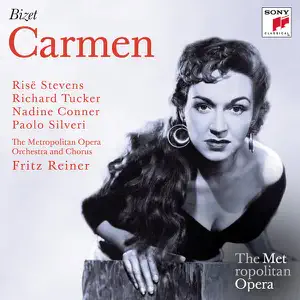


CIUDAD NATAL
New York, NY
NACIMIENTO
11 de junio de 1913
Acerca de Risë Stevens
Mezzo-soprano Risë Stevens was one of the most prominent American opera stars during World War II and for nearly two decades afterwards. She was of Norwegian descent; her original name was Risë Steenberg. She showed early promise as a singer and studied with a teacher named Orry Prado. After graduating from high school, she landed a job with the New York Little Theater Opera Company. After that company went bankrupt, she became a dress model.
Anna Schoen-René, a voice teacher at the Juilliard School, offered her free singing lessons. Risë received a tempting job offer from the Metropolitan Opera Company, but judged she was not ready and declined it. Instead, she went to Europe to hone the various crafts of an opera singer. These included classes in stagecraft with Herbert Graf and continued voice training with Marie Gutheil-Schoder at the Salzburg Mozarteum.
In 1936 she accepted conductor Georg Szell's offer of a contract with the Prague Opera, where she was listed as a contralto. There she was coached in standard contralto and mezzo repertory by Herbert Graf, and appeared in Prague, Vienna, and in Cairo, Egypt (where she traveled as part of a Viennese-based opera group). She traveled to the Teatro Colón in Buenos Aires, continuing to mature and to draw increasing attention. She finally sang with the Met in one of its appearances in Philadelphia, as Octavian in Der Rosenkavalier, received a contract with the company, and made her New York Met debut on December 17, 1938, as Mignon.
In 1939, she married Walter Surovy, a Czech actor, who managed her career. She debuted at Glyndebourne in 1939, and in 1940 at the San Francisco Opera. In 1941 she sang opposite Nelson Eddy in the Hollywood film The Chocolate Soldier, and appeared in Bing Crosby's film Going My Way (1944), in which she sang the Habañera from Carmen. This led to her first actual stage performance as Carmen at the Met, December 28, 1945. For some time she virtually owned the role at the Met and sang it there 75 times. She debuted at Milan's La Scala in 1954.
Stevens retired from the Metropolitan in 1961, and retired altogether from singing in 1964. Shortly after her resignation from the Met, the company went through one of the worst crises in its history. General Director Rudolf Bing cancelled the entire 1961-1962 season after the company's major unions reached an impasse. Stevens sent a telegram to President John F. Kennedy outlining the importance of the Metropolitan to the United States and the world, and requested his intervention. The president honored her request, and personally persuaded the sides to accept the Secretary of Labor, Arthur Goldberg, to arbitrate their disputes. The season was saved.
Stevens' mezzo-voice quality was unusual: it was warm, light, and lyrical. This suited her to many of the important "trouser" roles. In addition to Octavian, she sang Mozart's Cherubino and Prince Orlovsky in Fledermaus. Other of her favorite roles were Dorabella, Delilah, Orpheus, Laura (La Gioconda), and Carmen, her most famous role.
After she retired from the Met stage, she became director of the company's new Metropolitan Opera National Company, a touring group providing opportunities for young singers and conductors, as well as designers and directors to participate in opera on a steady professional level. She was appointed to the faculty of the Juilliard School of Music in 1975, and was president of the Mannes College of Music in New York (1975-1978). She was again associated with the Metropolitan from 1980 to 1988 as director of its National Council Auditions.
Anna Schoen-René, a voice teacher at the Juilliard School, offered her free singing lessons. Risë received a tempting job offer from the Metropolitan Opera Company, but judged she was not ready and declined it. Instead, she went to Europe to hone the various crafts of an opera singer. These included classes in stagecraft with Herbert Graf and continued voice training with Marie Gutheil-Schoder at the Salzburg Mozarteum.
In 1936 she accepted conductor Georg Szell's offer of a contract with the Prague Opera, where she was listed as a contralto. There she was coached in standard contralto and mezzo repertory by Herbert Graf, and appeared in Prague, Vienna, and in Cairo, Egypt (where she traveled as part of a Viennese-based opera group). She traveled to the Teatro Colón in Buenos Aires, continuing to mature and to draw increasing attention. She finally sang with the Met in one of its appearances in Philadelphia, as Octavian in Der Rosenkavalier, received a contract with the company, and made her New York Met debut on December 17, 1938, as Mignon.
In 1939, she married Walter Surovy, a Czech actor, who managed her career. She debuted at Glyndebourne in 1939, and in 1940 at the San Francisco Opera. In 1941 she sang opposite Nelson Eddy in the Hollywood film The Chocolate Soldier, and appeared in Bing Crosby's film Going My Way (1944), in which she sang the Habañera from Carmen. This led to her first actual stage performance as Carmen at the Met, December 28, 1945. For some time she virtually owned the role at the Met and sang it there 75 times. She debuted at Milan's La Scala in 1954.
Stevens retired from the Metropolitan in 1961, and retired altogether from singing in 1964. Shortly after her resignation from the Met, the company went through one of the worst crises in its history. General Director Rudolf Bing cancelled the entire 1961-1962 season after the company's major unions reached an impasse. Stevens sent a telegram to President John F. Kennedy outlining the importance of the Metropolitan to the United States and the world, and requested his intervention. The president honored her request, and personally persuaded the sides to accept the Secretary of Labor, Arthur Goldberg, to arbitrate their disputes. The season was saved.
Stevens' mezzo-voice quality was unusual: it was warm, light, and lyrical. This suited her to many of the important "trouser" roles. In addition to Octavian, she sang Mozart's Cherubino and Prince Orlovsky in Fledermaus. Other of her favorite roles were Dorabella, Delilah, Orpheus, Laura (La Gioconda), and Carmen, her most famous role.
After she retired from the Met stage, she became director of the company's new Metropolitan Opera National Company, a touring group providing opportunities for young singers and conductors, as well as designers and directors to participate in opera on a steady professional level. She was appointed to the faculty of the Juilliard School of Music in 1975, and was president of the Mannes College of Music in New York (1975-1978). She was again associated with the Metropolitan from 1980 to 1988 as director of its National Council Auditions.
Canciones más vistas de
Risë Stevens en Enero
Top Artistas
Nosotros
Notas
